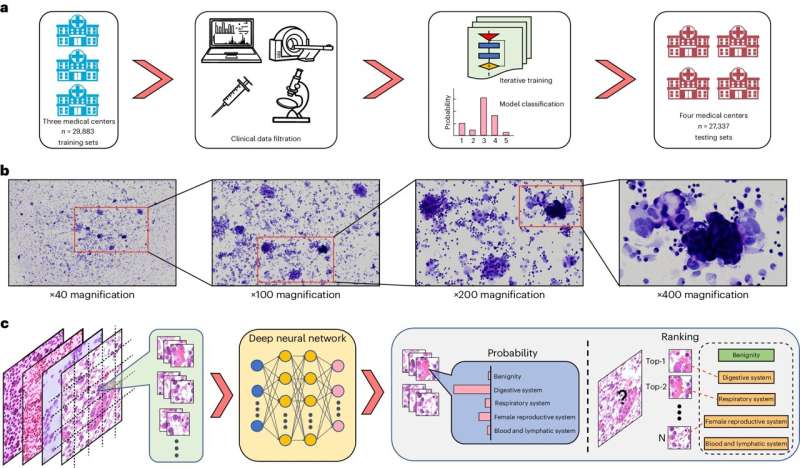April 19, 2024 report
This article has been reviewed according to Science X's editorial process and policies. Editors have highlighted the following attributes while ensuring the content's credibility:
fact-checked
peer-reviewed publication
trusted source
proofread
Using AI to trace the origins of metastatic cancer cells

A large team of cancer researchers affiliated with several institutions in China, working with a pair of colleagues in the U.S., has found that artificial intelligence applications can be used to trace the origins of metastatic cancer cells in remote parts of the body.
In their study, published in the journal Nature Medicine, the group trained an AI app to identify cancer cells found in bodily fluid samples as a means for tracing them to their origin.
When cancerous tumors arise in the human body, they do not always lead to symptoms revealing their presence that would cause a person to seek medical attention. Sometimes, such cancers metastasize before they are discovered, making them much more difficult to treat when they are finally found. So physicians collect body fluid samples from patients and send them to a lab for testing.
Tumors tend to have a unique appearance depending on where they develop—lung cancer cells all have the same general appearance but look much different than breast cancer cells, for example. Lab technicians are taught to recognize metastatic cancer cells in fluid samples and to identify which kind they are, which allows doctors to find the site of the original tumor and treat it.
Unfortunately, lab technicians are not always able to spot all metastatic cancer cells in fluid samples or to identify them when found. In this new study, the research team explored whether an AI app might be better at spotting and identifying such cells than lab technicians.
The team trained an AI with 30,000 images of metastatic cancer cells from patients whose tumors had been located; the researchers then tested the AI on 27,000 additional images and found it to be 83% accurate in spotting and identifying a tumor type. The team then ran more tests to compare the AI's accuracy against human lab technicians and found that the AI app gave better results in a variety of categories.
The research team also found that those patients who had received treatment designed to fight their specific cancer were more likely to survive and also tended to live longer, which suggests use of AI to find and trace metastatic cells in the body could improve outcomes for many cancer patients.
More information: Fei Tian et al, Prediction of tumor origin in cancers of unknown primary origin with cytology-based deep learning, Nature Medicine (2024). DOI: 10.1038/s41591-024-02915-w
© 2024 Science X Network





















